Audi Ancestor: 1963 DKW Junior Deluxe
Most of us know the story of Auto Union, or at least how the famous four rings came about with four companies coming together. One of the four companies was DKW and this 1963 DKW Junior is one interesting project car. It can be found here on eBay in Hinckley, Ohio with a $1,475 buy it now price.
Something similar to General Motors with several car brands under its umbrella, Auto Union AG was the entity under which Audi, Horch, DKW, and Wanderer found a home. DKW, just to make things even more confusing, had four meanings for the initials DKW. They were made as the DKW Junior until 1963 and at 13-feet in length they were just under the Auto Union 1000 which most of us have seen, or at least seen photos of.
The era of 1950s-looking cars was alive and well in the DKW Junior, they are really fun and interesting looking cars. This example will need a full restoration which even with a small car isn’t inexpensive. They’re small enough to restore in a single-car garage in a pinch and this one is complete other than one missing door panel, according to the seller. There is a little rust in the spare tire well in the trunk and rear decklid corner and that’s it for rust-through. The underside shows heavy surface rust which hopefully can be treated.
The windshield has cracks from BBs it sounds like and the rear window came out due to dried rubber everywhere. It could be a little challenging to find anything like window rubber that would be needed and this will never be a high-dollar car even in Concours condition so the next owner will be doing most of the work themselves most likely. The seats are cracking but everything will be stripped out and redone anyway, I’m guessing/hoping.
The engine is missing but it’s included and is in good shape, according to the seller. It was taken out to do the front brakes! Well, even though they’re inboard brakes they also took it out to do the clutch and put on a new head gasket. They go on to say that the head gasket doesn’t leak so I’m not sure why they added that part. It’s DKW’s 796 CC two-stroke triple-cylinder which had 34 hp. You’re right, with a 0-60 time of 28 seconds, this car had better not see much American freeway duty but, of course, they weren’t made for American freeways. This would be a fun little project, have any of you owned or driven a DKW Junior?
Auctions Ending Soon
 1977 Datsun 280ZBid Now22 hours$600
1977 Datsun 280ZBid Now22 hours$600
 1969 Ford MustangBid Now2 days$500
1969 Ford MustangBid Now2 days$500
 1965 Ford Falcon Station WagonBid Now5 days$1,000
1965 Ford Falcon Station WagonBid Now5 days$1,000
 2002 Jaguar XK8 ConvertibleBid Now6 days$100
2002 Jaguar XK8 ConvertibleBid Now6 days$100
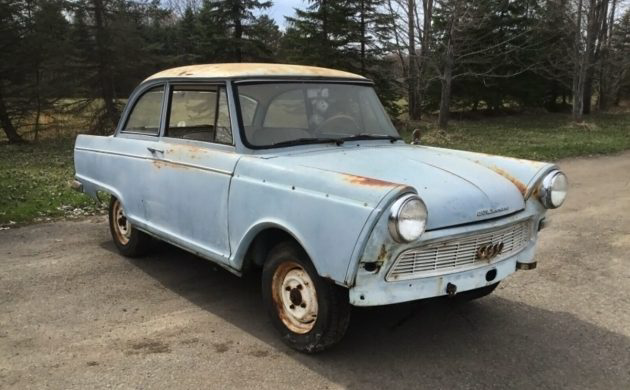
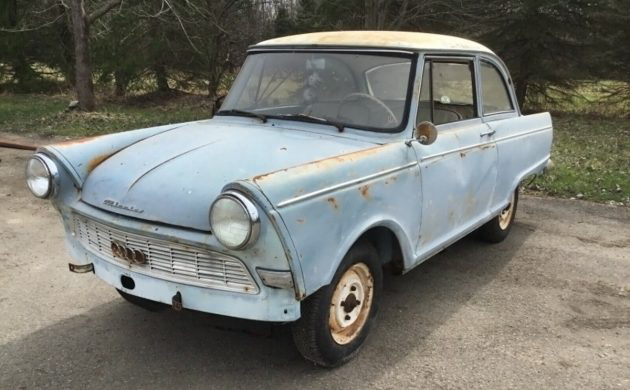
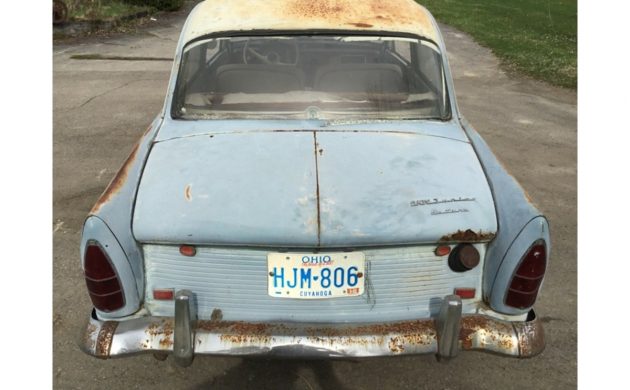
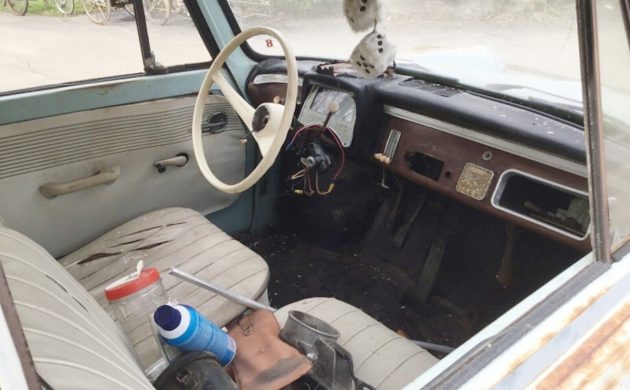
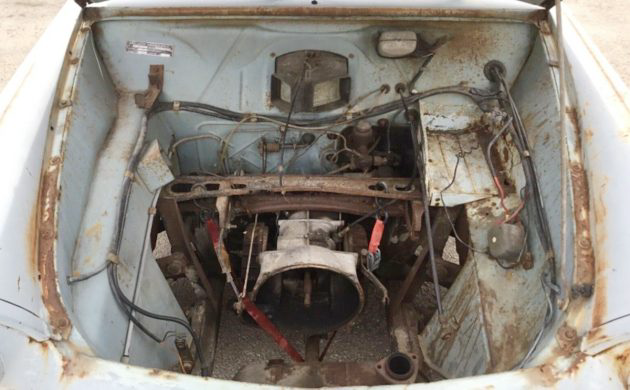

Comments
Back in the mid sixties an accointance ( darn spell check) owned one of these. Strange little car. He traded it for a 3 cylinder 2 stroke Saab. He must have had a thing for oddball cars.
Now this brings back some memories. Whenever we’d travel down to the official swimming pool in Sunburst, there was a lady who packed four of five kids in a car very similar to this one. Every once in a while she couldn’t start it so a bunch of us would push it back from the curb and then give her a push down the street. She’d slam it into gear and let the clutch out; the engine would catch immediately and off she’d go trailing a cloud of blue smoke. It seems to me that the fuel had to be mixed with oil. I could stand corrected on that…
I always get such a kick out of these high end cars today, their humble beginnings. Any relation of this to a new Audi is strictly coincidental. It is a neatly styled, but you’d have to be nuts to equip it with the original motor, heck, a Briggs or Honda twin lawn mower engine would probably do a better job. I read, this car would have had oil injection, I believe one of the 1st vehicle makers to do so in 1962, and quietly revolutionized 2 stroke operation, although, it would take years before it became the norm. It was fed from a tank and pump mounted on the firewall, which I don’t see here.
http://www.carsandracingstuff.com/library/articles/22150.php
Yep, it´s a 2-stroke 3-cylinder so you are correct on the oil thing. I´m not sure though if it needs to get the oil poured in with the gas or if it sips in from a separate dispenser (i know some later-day 2-stroke car engines from the period have that solution), There are more than similarities between this engine and the Saab 2-stroke as the earlier 2-cylinder 2-stroke DKW was closely studied by the german submarine engineer who constructed Saabs first engine. On the other hand, Saab beat DKW on being the first to come out with a 3-cylinder although DKW was working on one before WW II. That engine became spoils of war ending up in the East Zone (later the DDR) where it powered the IFA (east german DKW ) and i believe that same engine went on to power the Trabant. But as said, the original brand reinvented their original design from the specs and later on track racers would use tuning parts made for the Saab 3-cylinder to make the DKW´s go fast. As far as i´ve heard, most parts needed none or little reworking to make the transfer. By the way, a friends dad hotrodded a Auto Union 1000 (also known as DKW 3=6) into making relatively good power with mostly cheap tricks such as glueing balsa wood chucks on the bottom of the pistons to raise the compression… it actually worked! He said it ran like… well, you guess. On the downside, due to the hard compression it spitted fuel out of the three carbs when running in idle. Fun fact; not long ago here in Sweden, some other guy restored a parts car DKW 1000 he had laying around and replaced the missing engine with an electric power source from a junked forklift. Not that fast, but then again it wasn´t to begin with either. One has to appreciate the ingenuity and effort to get it working well and it has been getting a fair amount of interest on car shows. As for the Junior (sometimes sold as DKW F12), a then young voman living upstairs when i was a kid had one like that but a later model with a horisontal ribbed grille, creamy yellow with a black roof. The last DKW was the F102 that became the first modern Audi – the 60 – when the 2-stroke engine was ditched in favour of a high compression 4-stroke straight four built especially for it by then-owner company Daimler-Benz. Certainly very few Auto Union/DKW cars left here, too.
Looks like the buzzards that fly to Hinckley, OH picked this one pretty clean.
Bought one about 15 years ago in about the same shape. Parts are available, except for the fact that you have to go to Brazil or South Africa. Bought it for 400.00 and sold it for 500.00, so all is good.
I suggest a Hayabusa motorcycle engine even if that´s a 4-stroke :D. The DKW ought to be light enough to work well with it – remember the competitor BMW 700 series factory equipped with their R75 motorcycle 2-cylinder boxer engines, quite competitive in track racing too. I´ve seen a Lotus Seven-style kit car run like lightning around the local race track with the Hayabusa engine and Youtube has a bunch of fast Volkswagen Beetles fitted with Hayabusas. Or maybe a Mazda rotary engine would do the trick, obviously with safety upgrades in both cases. Come to think of it, being a Wankel derivative it would be sort of kindred in the lineage of NSU using Wankel engines and both them and Auto Union/Audi ending up being owned and put into one company (Audi-NSU AG) by Volkswagen. Btw, thank you Howard A for posting the link to the article. That led me further through a rabbit hole to some Ford stuff :)
Oh yeah, this works. I’d find some suitably cheap engine for this, leave the body and interior as is and rock it while wearing a fez and happily singing Rock the Casbah by The Clash………..like……………..
I’ve had numerous DKW vehicles, including sedans like this one, also a civilian version of the DKW Munga military 4WD “jeep”, and I currently have a 1000SP 2-passenger coupe with a body by Bauer of Germany, the same coachbuilder that made the original Porsche speedsters. That car uses the DKW 3-cylinder engine with oil injection, but is badged as an Auto Union, the last cars to bear that name as a marque.
If someone buys this and wants a parts car, I have available an almost identical car, stored in a dry building since about 1970, not run since then, engine does turn over too.
99% of mechanical parts and pieces like the glass are available from South America, as they were sold & assembled there by DKW well up into the late 1970s. When I had the Munga, I was buying DKW parts from a guy up in Washington state, but now, 25 years later I doubt he’s still alive. Some trim parts are getting hard to find, especially for the 1000SP coupes & convertibles [those are the cars that sort of look like a smaller ’57 T-bird]
Back in the early 1970s I was stationed in Germany as part of the US Army, and we had a saying there about East Germany’s versions of a “jeep”. They were based on the 2-cylinder pre-war DKW 2-cylinder engine, and those East German 2-stroke vehicles all had terrible oil smoke, so bad that we used to joke that if an invasion from East Germany was starting, we’d know because of the cloud of blue smoke headed towards the Fulda Gap!
I bought this one. Do you still have the parts car?
It’s still available, hasn’t moved. It’s owned by a good friend of mine. It’s basically a complete car, but the roof was dented in [probably by kids jumping on it. Car has been in dry storage for decades, but needs a lot of TLC. You can contact me at my email, it’s my name [without the space] @aol.com.
Sure looks like a relative of the Amphicar to me!
I was going to say the same!
BEGGING for an LS…
I had one of these when I was in high school back in 1968.I paid $50 for it. What an absolutely wonderful little car. I could not say a single bad thing about it.I would dearly love to have this little DKW but I live in New Brunswick,Canada and it would be just to costly to get it here.It has been on my bucket list for years to own another one before I die.I keep hoping that one will come up for sale somewhere in Canada.